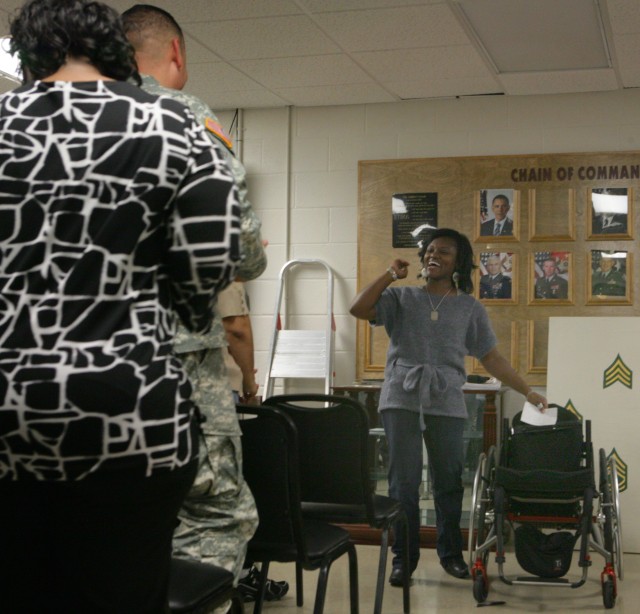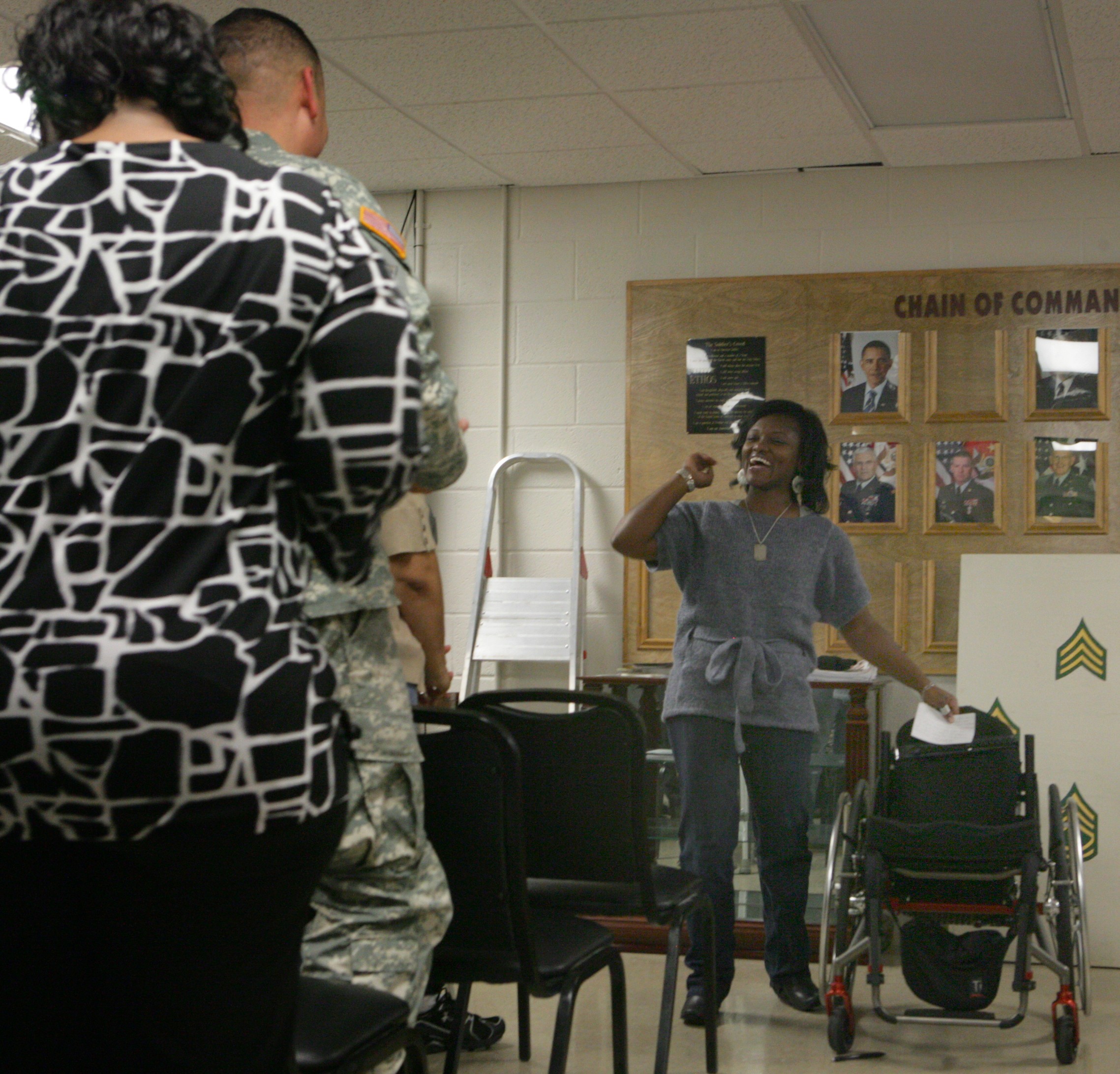
FORT SILL, Okla.-- Departing and arriving Soldiers at the Warrior Transition Unit met a retired Soldier well versed in overcoming difficult circumstances during the unit's monthly hail and farewell luncheon Nov. 12.
CeCe Mazyck, who attained the rank of sergeant first class, scaled new career heights in leaps and bounds turning an opportunity to serve her country into a fast track rise to success. However, a horrifying accident changed the course of her life.
Serving in personnel for the 82nd Airborne Division at Fort Bragg, N.C., Mazyck found a career field she enjoyed because it enabled her to help Soldiers with the various day-to-day issues many face. The position also allowed her to continue her education, something that was a driving force in her enlistment plans. Shortly thereafter, she moved on to the Advanced Airborne School, which trains Soldiers to become jump masters.
During her time there a new first sergeant arrived and required all personnel to complete jump master training. She completed that training, something she called the hardest school she attended in the Army.
But, despite finding a career field she excelled in and developing a growing love for Army life, all that changed during a training parachute jump when she literally plummeted back to earth just prior to Thanksgiving seven years ago. Even the advanced knowledge she gained could not prevent the tragic accident that befell her. As she exited the aircraft on a training jump, strong winds blew her into another Soldier and the two became entangled. Though she did everything she could to separate herself, by time she got free, she was too close to ground to adequately slow her descent.
Compounding the trauma, she hit with her legs apart resulting in crushed vertebrae and immediate paralysis from the waist down.
"I initially thought it was just a hard landing as those happen sometimes so I tried to get up to take care of my chute," said Mazyck, who soon realized she was unable to move.
She said she didn't consider she was paralyzed, as it wasn't something that even entered her mind. But then the pain kicked in, and being a single parent, thoughts of her son, Tristen, and other family members flashed through her mind as she wondered what would happen next.
Doctors examined her and told her parents she would never walk again, however, Mazyck's strength of character came to another conclusion.
"I wouldn't hear it," she said.
Although she deals with many of the same things fully paralyzed people face, such as loss of lower body sensations, she called her condition incomplete paralysis. Incomplete because less than five days after her surgery to repair damage, Mazyck took her first steps.
"I had to show them I could do it," she said, "I just knew I'd walk again."
Her rehabilitation took her from a wheelchair to forearm crutches, a single crutch and finally a cane, which she still uses when she walks. For the most part, Mazyck relies on her wheelchair to get around, but will rise as needed or to show others they too can overcome.
"I appreciate this opportunity to speak to fellow disabled veterans. I want to get this story out there to motivate those who believe life is over and to realize God gave us a second chance and there's still so much life to live," she said.
It's that desire that drives her today. Sure, Mazyck will tell people it's a miracle she survived the fall, but in the same breath she shares her new mantra to those she meets adapt and overcome.
Critical to her rehabilitation, she said anyone needs to find a good support system to get through a day. For her, it was her family, one which many of its members served in the military and could understand the significance the Army played in her life. Mazyck's visit to Fort Sill coincided with a family function, and her uncle, Sgt. Maj. Robert Clark, Fires Test Directorate sergeant major, arranged the speaking engagement.
Raised by her grandparents, Clark became a second father figure to Mazyck and helped her transition into adulthood. She affectionately calls him her uncle daddy.
"I hope CeCe's story inspires you and that whatever you're going through that she helps you realize it's not over," said Clark to the WTU Soldiers. "The Army and the armed forces care for wounded warriors and will take care of you like they took care of my niece."
Standing patiently and quietly by her side, Tristen, 8, is another key part of Mazyck's recovery.
"I thank God every single day for my son, he means the world to me and is one of the main reasons why I live today," she said.
While education continues to play a role in her personal development, she is now a senior at the University of South Carolina studying sociology, she has adapted her fitness and recreation activities to her new abilities. She now plays sled hockey, basketball, softball and bowling, and water skis. These activities are fun for her, but there's another pursuit that has captured her attention. Anyone who shakes hands with Mazyck will realize there's more than just the strength of character within this woman. Power lifting ignites her passion to excel.
"When I'm in the gym lifting I feel on top of the world and able bodied," she said. "It takes more strength and will power to compete in some of these sports, but I'm extremely competitive and work hard at it."
Mazyck continues to pump iron three times a week with hopes of lifting herself onto the U.S. Paralympic power lifting team.
For one who laid on the unyielding earth seven years ago wondering what might become of her, Mazyck realizes now there's more she has to give.
"My accident has made me look at life a little bit differently, in part, because I'm different on the outside. Society treats me different since people see me in wheelchair most of the time. People staring at me bothered me at first, but the more I get out and face that, the more confident I become. With that self-assurance, I realize I can do anything," she said.
Five to 10 years down the road, Mazyck envisions herself married, holding a master's degree and continuing to help people. Through it all she knows there will be good days and bad, but the good far outweigh the bad. As for where her rehabilitation efforts have brought her and where her life will take her, she summarized that thought succinctly.
"This is only the beginning," she said. "I will continue to embrace what life has to offer and do more than hope for happiness.
"I will live it."

Social Sharing